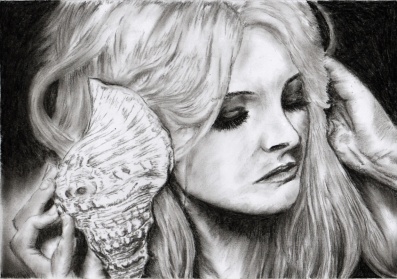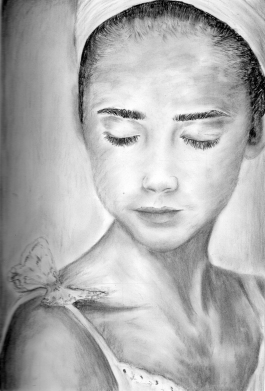
I’ve been wanting to write another blog post for what feels like ages but other things got in the way. It’s a topic that relates to one of my very early posts on my previous blog. My thoughts are very different to what they were then so I feel like it is time for some long overdue reflections and updates.
The words that always still comes to mind whenever I think of the phenomenon of hearing voices is a quote from Harry Potter and The Chamber of Secrets…
‘Hearing voices isn’t a good sign Harry, even in the wizarding world.’
I would say the same remains true in the muggle world. Hearing voices is presented as something that shouldn’t be happening, even by mental health professionals. It’s seen as the pinnacle severity of mental illness and something that has to be eliminated to ensure wellness again. In my previous blog post on hearing voices, which was written over 4 years ago, I gave the impression that I was striving towards a voice-free life, but in truth, I was just shutting them out because I felt well in so many other ways, and the line I was being fed by mental health professionals at the time was that hearing voices was something that needed to be stopped in order for me to be considered ‘well’, and it’s in my nature to try to please.
Hearing voices isn’t the extraordinary phenomenon many people imagine it to be. I think we could all relate to the idea of our thoughts becoming very loud and intrusive – the line between what some perceive to be separating sanity and insanity is much finer than many would like to believe.
The truth for me is that I never knew that hearing voices or seeing things that other people can’t was anything out of the ordinary until someone told me that it was. It was my normality. It still is. People tend to automatically associate auditory and visual hallucinations with psychosis and schizophrenia, but hearing voices is a symptom that spans across a wide range of mental health difficulties, including but not limited to eating disorders, OCD, personality disorders and trauma related conditions. Not only this, but outside the context of mental illness, I have come across some people speaking of hearing a voice in their head telling them to do something, or not to, almost like an extension of their conscience. The phenomenon of mistakenly seeing a vision of a loved one who has passed away is also widely reported. This is something I have experienced myself, as have some of my family members who have never considered themselves as suffering from mental illness.
In my case, some of my earliest childhood memories were of playing with a little girl who looked like me and had the same name as me but that no one else seemed to be able to see. I have heard conversations between voices in my head for as long as I can remember, and people would frequently accuse me of talking to myself, when, as far as I was concerned, I wasn’t. This was my reality, my life. It was all I knew and I could only assume that this was how it was for everyone else was as well. Nothing could have prepared me for the look of utter horror that fell upon me as a teenager when for the first time I said out loud that I heard voices. My world shattered around me. I quickly discovered that while this was my normal, it clearly wasn’t what other people wanted to hear about.
I put my walls back up around me and retreated back into silence, even if my head was anything but silent. From time to time I experienced that look of concern again. A look that said – this shouldn’t be happening, we need to stop this. I learnt to meet that concern with denial. Until one day someone saw past me giving the answer everyone wanted to hear. Someone asked me something different, “What are they saying?”. That someone was my current (amazing) therapist, and I hadn’t even said I was hearing voices, in fact I repeatedly denied it, as I’d learnt to. Never in all those years had anyone ever asked what the voices were saying or anything about them. It was as though they didn’t care to know, or maybe they were afraid to. It took a fair while for me to accept and let someone else into my internal world when I had built my walls so high and denied its existence for so long, but taking that leap of faith changed so much.
I wasn’t crazy, weird, or ‘different’. There was a name for what I was experiencing – Dissociative Identity Disorder. These younger parts of me and their voices were what helped me survive, they deserve better than to be banished and dismissed. I was led to my most important life lesson to date – to work with the voices and not against them. It was that lesson that changed so much.
Dissociative Identity Disorder is a condition that is not very well known or understood, even among mental health and medical professionals. I have still experienced that concerned look from a number of professionals who are less familiar with the condition or who were not fully aware of my history when they ask me whether I am hearing voices or seeing things that other people can’t see. They then appear even more concerned and quite taken aback when they hear my response.
“Yes I do hear voices in my head and I do see younger parts of me visually in front of me at times, but that’s nothing out of the ordinary for me. It would be more unusual for me if they weren’t there.”
I have ended up with some rather entertaining reports stating something along the lines of: ‘Lorna experiences both auditory and visual hallucinations but she says it doesn’t bother her!’ That isn’t true either! Dissociative Identity Disorder does bother me. Sometimes it feels like there’s a whole world going on inside my head that no one else can see. Sometimes I feel torn and conflicted, pulled in several different directions at once. Sometimes those other parts of me feel like my own worst enemies, but I wouldn’t change any of it for the world. Those parts of me are what makes me me. Losing them would be like losing a close relative, a best friend who has always been there, and I’d lose myself in the process.
I’ve also had the experience of professionals seeing me dissociating and switching between parts in front of them as a sign of me being ‘unwell’. When really it is just a sign of me responding to a situation in which I feel overwhelmed or that has triggered something from my past. The reality is that they are just seeing a small proportion of what is going on in my head the majority of the time. The only difference is that it is out there for them to see.
This brings me to the main point of this blog post…
What if the thing that others see as a sign of you being unwell and are wanting to get rid of is in fact an integral part of your life?
L I S T E N T O T H E V O I C E S
Those voices have come into your life for a reason, even if that reason never becomes clear. I honestly can’t explain fully just what a difference it made to have someone encouraging me to see the positives of having DID and all that comes with it. Dissociation is such a clever survival mechanism and it can become a really effective coping mechanism if used in the right way. I’m sure most people can relate to the idea that if you shut something out, it just comes back ten times stronger. Hearing voices is the same. If you ignore them or shut them out, they just shout louder. So listen.
C O N C E N T R A T E O N T H E W H Y R A T H E R T H A N T H E W H A T
When I say listen to the voices, I’m definitely not saying that you should do what they say, especially if they are instructing you to do something harmful. I have experienced parts of me telling me to kill myself, to jump in front of trains, to jump out a window, and to engage in countless other self-destructive behaviours. Obviously I did not do what they told me, otherwise I wouldn’t be here today, but that doesn’t mean I didn’t listen. By listening I mean that I try to consider why parts of me are saying what they’re saying. Are they scared, sad, excited or overwhelmed? Are they worried about something? Are they expressing a need? Can that need be met another way that does not involve harm? I find that it’s no different to dealing with people – once someone feels listened to and as though their concerns are being heard and addressed, they quieten down.
I am aware of the fact that I am writing this purely from the perspective of suffering from a trauma-related mental health condition that involves hearing voices. As I stated at the beginning, hearing voices is a symptom that can occur across a wide range of mental health problems. However, I believe that a lot of the advice I’ve shared may still be applicable to others to some extent.
S E E T H E P E R S O N B E H I N D T H E S Y M P T O M S
As far as I know, I have not personally experienced psychosis, but through my journey with mental health I have come across others who have. From what limited understanding I have of it from seeing people being treated for psychosis, the focus among professionals seems to be assessing and identifying the symptoms and using medication primarily to treat it, reduce the symptoms, and ultimately get rid of them. Similarly to my own experiences with DID, I find that with psychosis, a lot of professionals tend to focus on the symptoms rather than the person – the what rather than the why.
C O N S I D E R T H E L I F E S T O R Y B E H I N D T H E V O I C E S
I am not suggesting for one minute that all psychotic episodes are rooted in trauma, but most people I have come across who have experienced psychosis would agree that significant life stresses and events seemed to precede an episode or exacerbated their symptoms further. I remember watching a documentary about bipolar a good few years ago by a German psychologist who highlighted a very crucial point – there is a tendency amongst mental health professionals to focus on what symptoms people with bipolar are experiencing in the here and now, rather than asking what happened to them? What was their life story? What was happening in their life in the lead up to them developing bipolar?
T H E P U R P O S E O F T H E V O I C E
There was also a brilliant documentary on hearing voices by BBC Horizon a couple of years ago, which I’m so glad I’ve just managed to find again – Why Did I Go Mad? . The documentary focuses on auditory and visual hallucinations within the context of psychosis, but I remember being stunned at the time by just how much I could relate to the experiences shared by the people who featured in the documentary, which is what makes me think that my reflections on hearing voices may be relevant universally. ‘Why Did I Go Mad?’ incited a radical rethinking of the traditional approach of psychiatry of treating symptoms that are regarded as indicative of ‘psychosis’ through medication, with the goal of ridding the individual of those symptoms. Alongside the treatment of medication, psychologists explore the role that the hallucinations people experience play in their life. For example, it was found that certain voices or visual hallucinations tended to feature when the person was experiencing a situation that involved fear, almost acting as a warning sign, or triggering memories of previous situations in which the person experienced fear. What may come across as a particularly dark or nasty presence or voice, might actually be serving a protective role. By considering the potential purpose or function of the voices people hear and attending to the thoughts, emotions and memories brought up, it was found that the voices would lessen in intensity and the distress caused. Listening is the first step to understanding.
S T O P T H E S T I G M A : E V E R Y V O I C E I S T H E R E T O B E H E A R D
It is clear that there is still so much stigma attached to hearing voices, which needn’t be there. Voices don’t exist in isolation. There is a person behind every voice. There is a purpose. There is a reason, no matter how unclear. There is a story behind every voice that needs to be heard. I have learnt so much from listening to the voices I hear, not just about myself, but about life and building positive relationships with others. I hope that by sharing these reflections about my own experiences of hearing voices, I am doing my little bit to lift the stigma that surrounds hearing voices.
Every voice deserves to be heard. So don’t shut them out. Hearing voices is a part of people’s lives and you can’t shut life out.
Listen.
Lorna ♥




